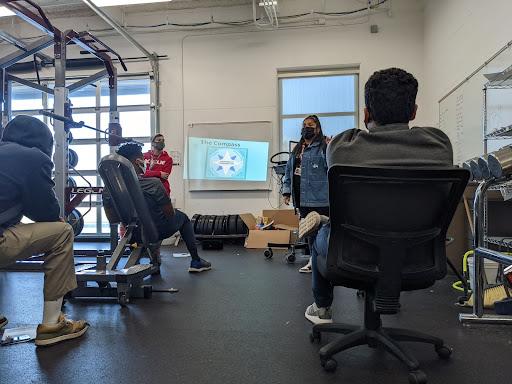
Photo by Luke Ramsey
For the first time in its history, Franklin High School ran its Franklin Talks program, an hour-long discussion surrounding racial equity that took place in classrooms throughout the school, on December 8, 2021.
In the 2021 Successful Schools Survey, Portland Public Schools (PPS) students were asked to reflect on their experiences talking about race at school. Only 45 percent of Franklin High School students reported that they are encouraged to think more deeply about race-related topics, while the district response averaged 59 percent, according to the PPS website.
Soon after PPS received the Successful Schools Survey results, Franklin Talks was established by counselors, the district, and Dean of Students (also known by her title of Climate and Equity Coach) Julie Palmer to encourage critical conversations about race in the classroom.
Palmer, who is black, explains how Franklin has molded the district’s directive for conversations about race into their own: “Last year the district decided that counselors needed to be more engaged in racial equity work and they were asked to deliver two of four pre-created lessons about race and racism.” Counselors realized that due to Franklin’s 2,000-student body, the district directive would be a bigger task than they could tackle with the general district lessons. “Our counselors felt uncomfortable just taking these lessons that someone else made and plopping them down into a lesson,” Palmer said. The counselors and Palmer worked instead to create relevant discussions for the Franklin community.
Franklin High School has completed one of the four 90 minute sessions that will be facilitated throughout the year. Palmer explains, “The first [Franklin Talks session] was really fundamental, [discussing] why we were doing this, talking about some tools like the [Courageous Conversations] Compass and understanding the emotional part of it, the belief part of it and the action part of who we are and what we do.” The February 16 session will focus on Racial Bias, March 14 will focus on Racism, and lastly May 18 will discuss Anti-Racism. “We really hope that the anti-racist session provides a little bit of hope and some opportunities for people to see what they can do,” Palmer says.
The implementation of Franklin Talks has raised a few questions from students. Some worry that Franklin Talks is only an attempt to fix a discrepancy of statistics. Oliver River Satalitch (12), who is white, was a participant of Franklin Talks. “Focusing heavily on that [Successful Schools Survey] data has given Franklin…an air of wanting to fix a lag in numbers instead of teaching students how to be empathetic and mindful about race,” they say.
Palmer suggests another explanation for the motivations behind Franklin Talks. “There is a call to action for our communities to be looking at ways to normalize the application of a racial lens across all curriculums,” she says.
Previously, Grant High School started something similar called Race Forward, with Palmer’s help. She says,“They have been doing Race Forward for probably seven years and it has been systematized. It is part of the culture at Grant High School…and it is making an impact.” Students at Franklin High School are hoping that Franklin Talks will be a platform for conversations about race to happen beyond structured time.
Yukpa Wright (12), who is Oglala Lakota and Klamath, is a student at Franklin High School who was nominated to be a co-facilitator for Franklin Talks. Wright and other students are hoping to normalize dialogue about race within broader classroom settings. “As a student of color I have definitely had a lot of awkward experiences in classes because there is no general education built into the classroom community,” says Wright.
Facilitators of Franklin Talks were made up of different teams. Some classrooms were being led by their classroom teacher, yet others had a student co-facilitator or even Principal Frazier. Not all classrooms got the opportunity to have a student facilitator in their classroom, such as that of River Satalitch who explains how that went for them: “Our conversation felt more like a lecture. It is in the name ‘Franklin Talks,’ but we did not talk, we were talked to.”
Student representation within facilitators sets a precedent for the understanding that students find this racial equity work important too. Seeing white staff and students be vulnerable is important as well. Palmer says, “It is so impactful for white people to see other white people being vulnerable owning their role, owning their understanding of their role of race in every institution.”
Franklin Talks may be a work in progress, as many racial justice initiatives are. But it is a stepping stone to a more inclusive culture that holds space for courageous conversations. Palmer says, “We want to cultivate young people who can leave Franklin…and have the ability to appreciate lived experiences that are different from yours.”

































